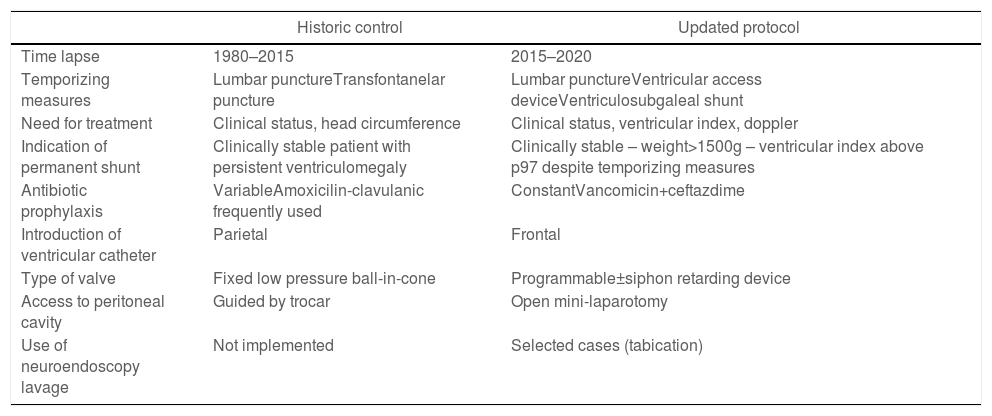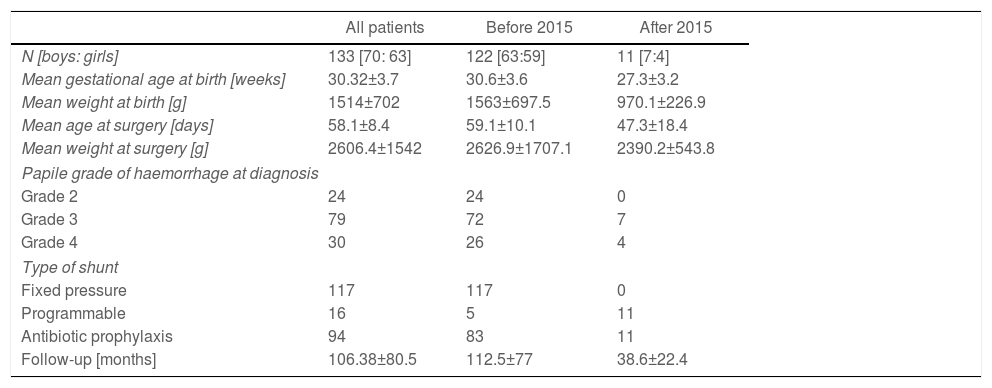Preterm-related posthemorrhagic hydrocephalus is a major cause of neurological impairment and a common indication for a ventriculoperitoneal shunt in infants that are prone to diverse complications. Protocols of diagnosis and treatment are in continuous evolution and require evaluation of their results.
ObjectiveTo review the clinical characteristics and results of a series of preterm-related posthemorrhagic hydrocephalus needing a definitive shunt from 1982 to 2020 in our institution. As a secondary objective we evaluated the safety of the changes in our protocol of treatment from 2015.
MethodsRetrospective review, clinical investigation.
Results133 patients were implanted a shunt in the study period. Shunt infection was diagnosed in 15 patients. Proximal shunt obstruction as the first complication was diagnosed in 30% of cases at one year, 37% at two years and 46% at five years. 61 patients developed very small or collapsed ventricles at last follow-up. Two thirds of our patients achieved normal neurological development or mild impairment. Changes in protocol did not significantly modify clinical results although improvement in most outcomes was observed. Mean follow-up was over nine years.
ConclusionsClinical outcomes are comparable to previous reported data. Changes in protocol proved to be safe and improved our results. Programmable shunts can be used safely in preterm patients although they may not prevent tendency towards ventricular collapse, which is very common after long follow-up.
La hidrocefalia poshemorrágica del prematuro continúa siendo una causa importante de lesión cerebral perinatal y una indicación frecuente de cirugía derivativa valvular en un grupo de pacientes particularmente vulnerable y expuesto a complicaciones. Los protocolos de diagnóstico y tratamiento están en continua evolución y requieren un análisis de los resultados asociados a ellos.
ObjetivoRevisar las características clínicas y los resultados de tratamiento en una serie de prematuros con hidrocefalia poshemorrágica en los que se implantó una derivación ventriculoperitoneal permanente en nuestro hospital entre 1982 y 2000. Como objetivo secundario evaluamos la seguridad de los cambios introducidos en nuestro protocolo desde 2015.
Material y métodoEstudio clínico retrospectivo, serie de casos.
Resultados133 prematuros requirieron una derivación ventriculoperitoneal permanente en el tiempo de estudio. En 15 de ellos se diagnosticó una infección del sistema de derivación. La obstrucción proximal de la derivación como primera complicación posquirúrgica ocurrió en un 30% de los pacientes al primer año, en el 37% de los pacientes a los dos años y en el 46% de los casos a los 5 años de seguimiento. 61 pacientes desarrollaron un colapso ventricular clínico o radiológico. Dos tercios de los pacientes presentaron un desarrollo psicomotor normal o un retraso de carácter leve. Los cambios incorporados en nuestro protocolo de tratamiento no modificaron la evolución clínica significativamente, aunque se asociaron a una evolución globalmente más favorable. La media de seguimiento fue superior a los 9 años.
ConclusionesLos resultados clínicos presentados se encuentran en línea con las series publicadas, Los cambios incorporados en nuestro protocolo actualizado demostraron ser seguros y pueden asociarse a una evolución más favorable. Los sistemas de derivación programable pueden ser empleados con seguridad en pacientes prematuros si bien no evitan de forma aislada el desarrollo del colapso ventricular, el cual es extraordinariamente frecuente a medida que se prolongan los tiempos de seguimiento.
Article

If it is the first time you have accessed you can obtain your credentials by contacting Elsevier Spain in suscripciones@elsevier.com or by calling our Customer Service at902 88 87 40 if you are calling from Spain or at +34 932 418 800 (from 9 to 18h., GMT + 1) if you are calling outside of Spain.
If you already have your login data, please click here .
If you have forgotten your password you can you can recover it by clicking here and selecting the option ¿I have forgotten my password¿.











